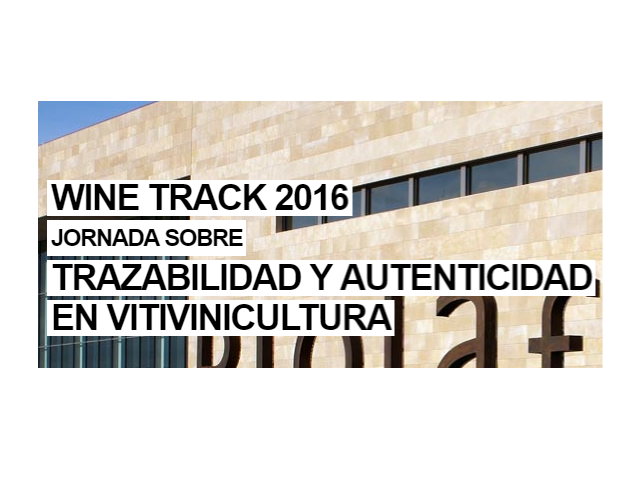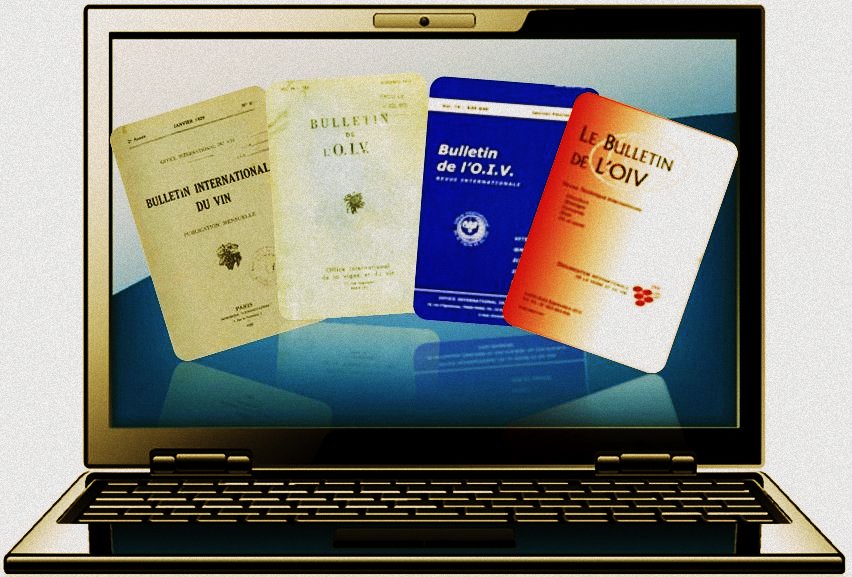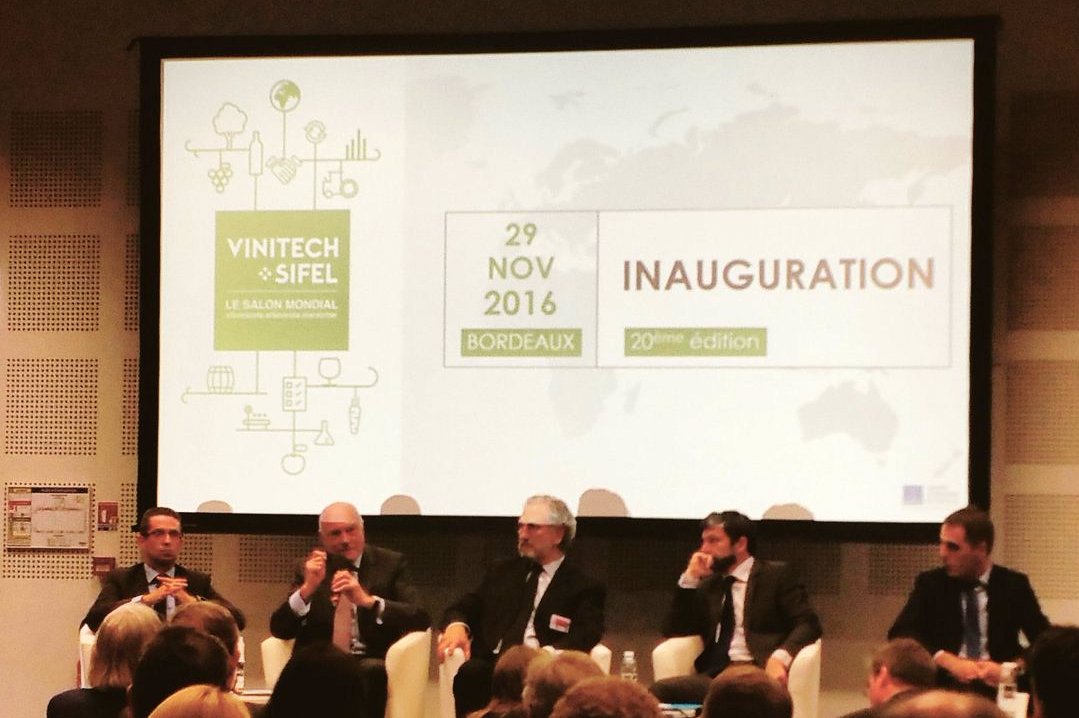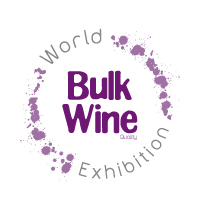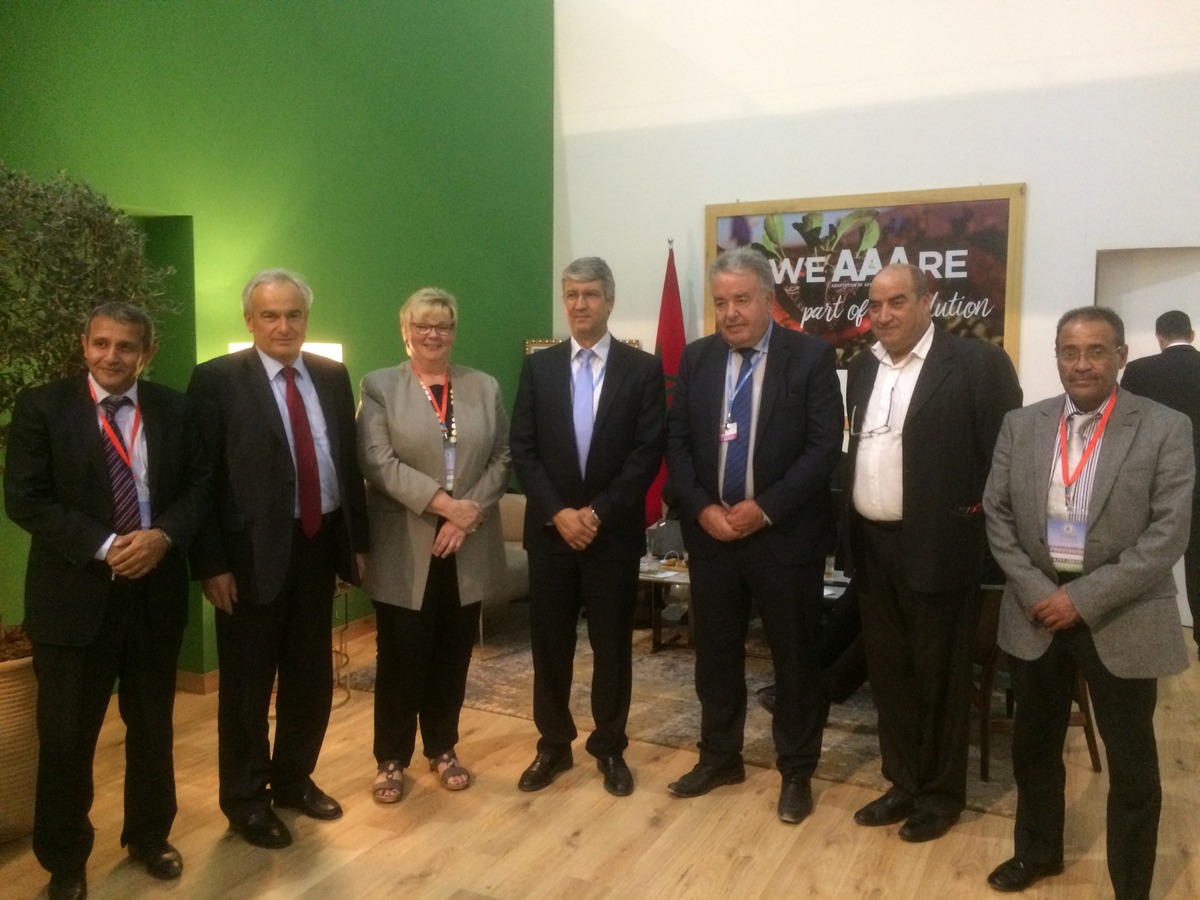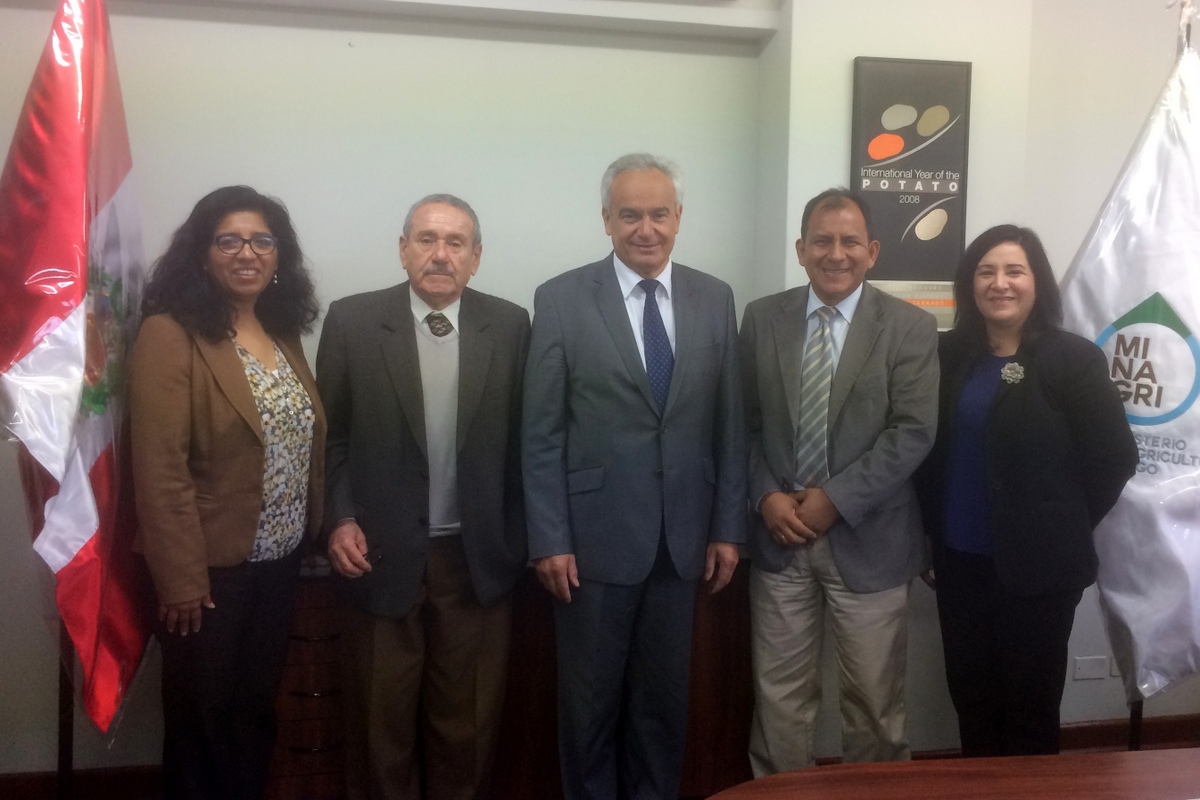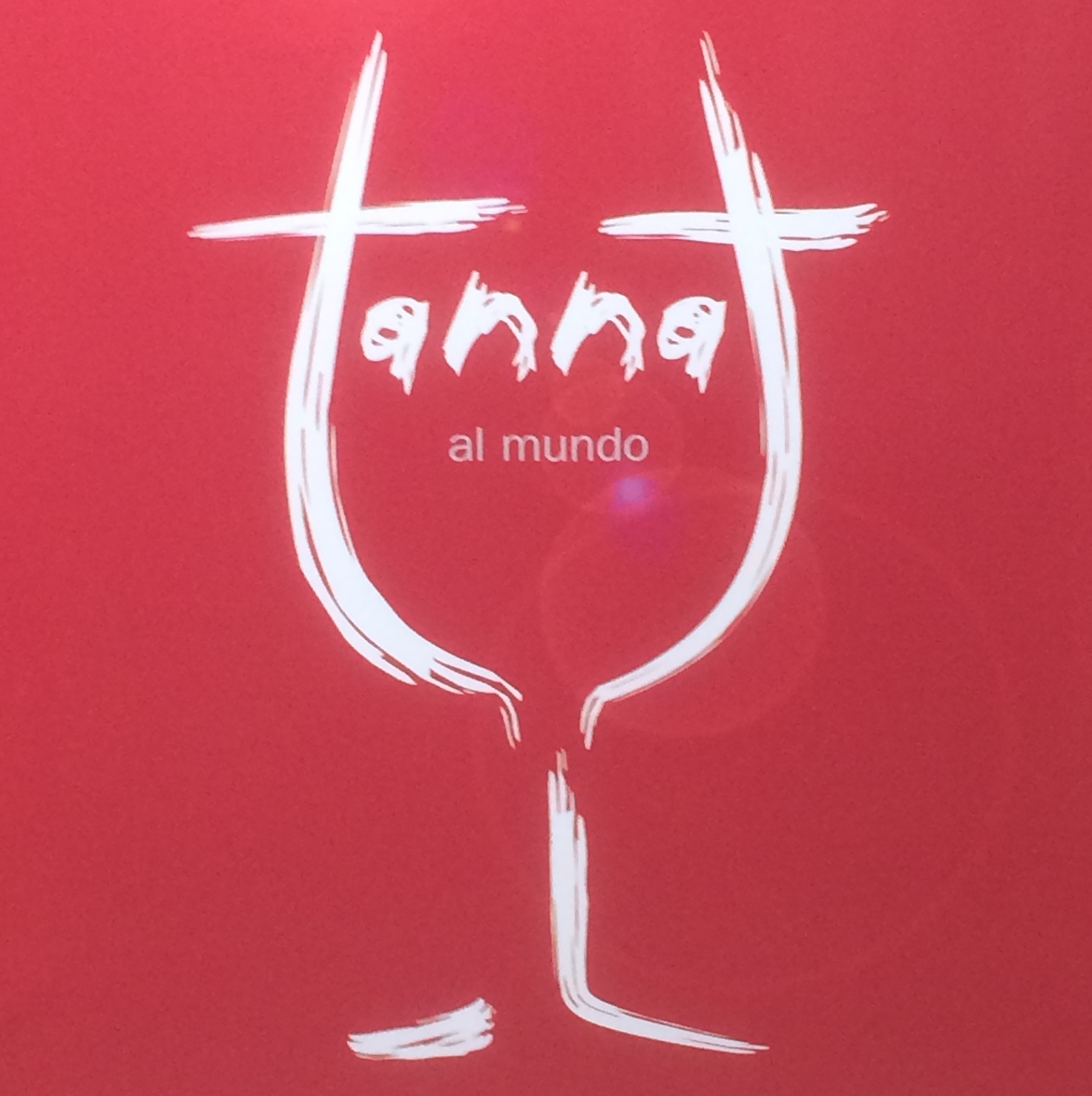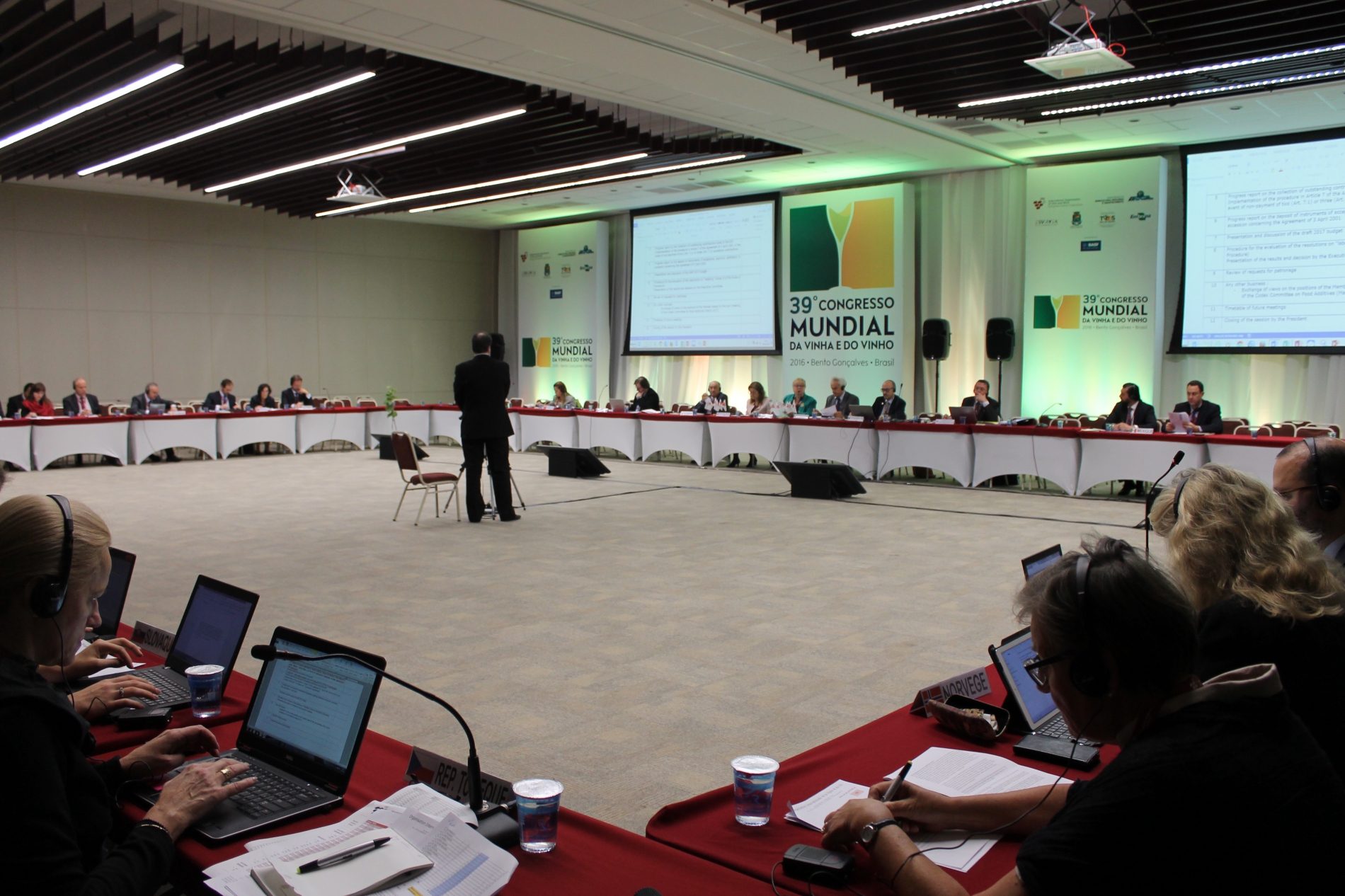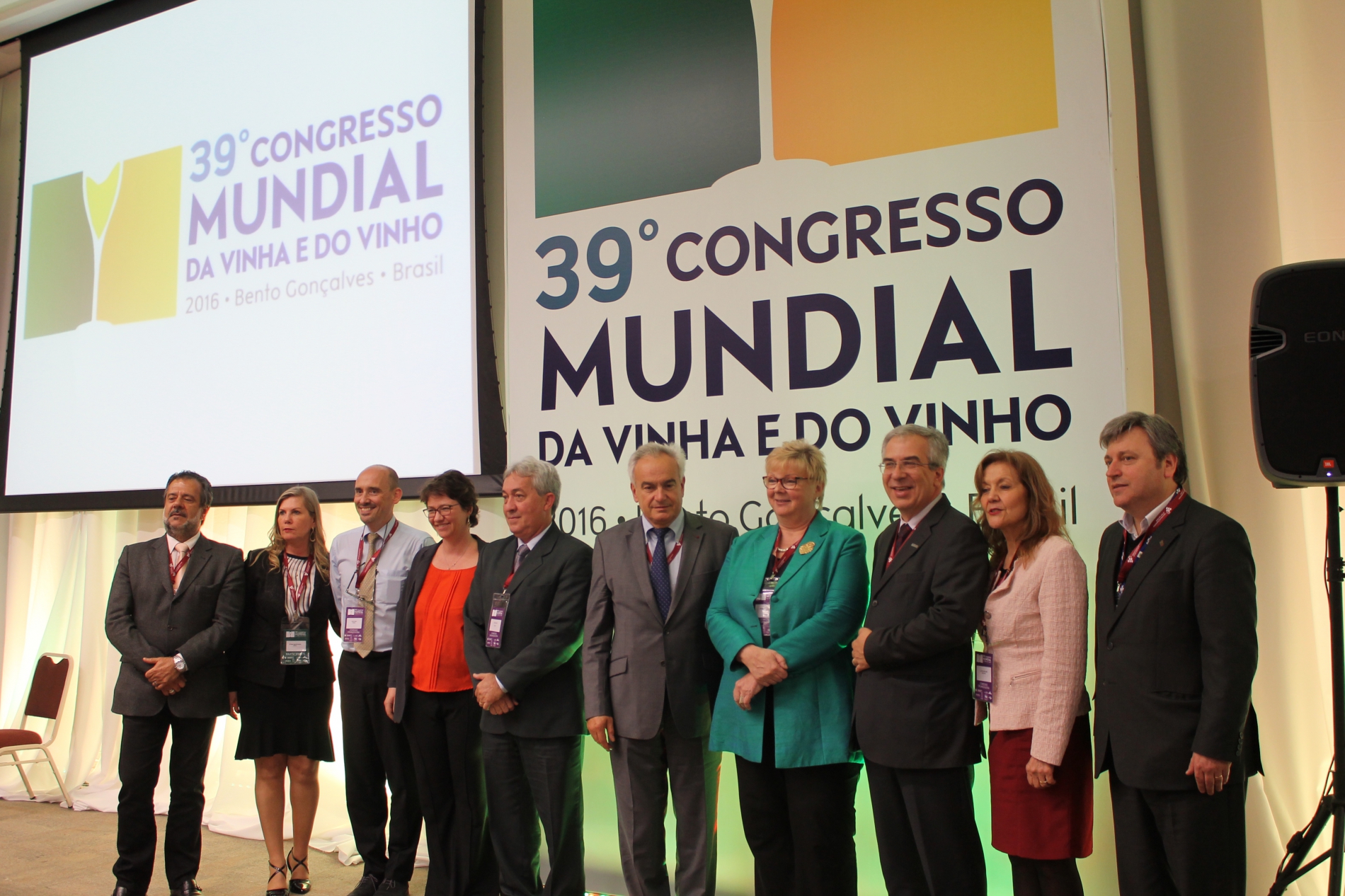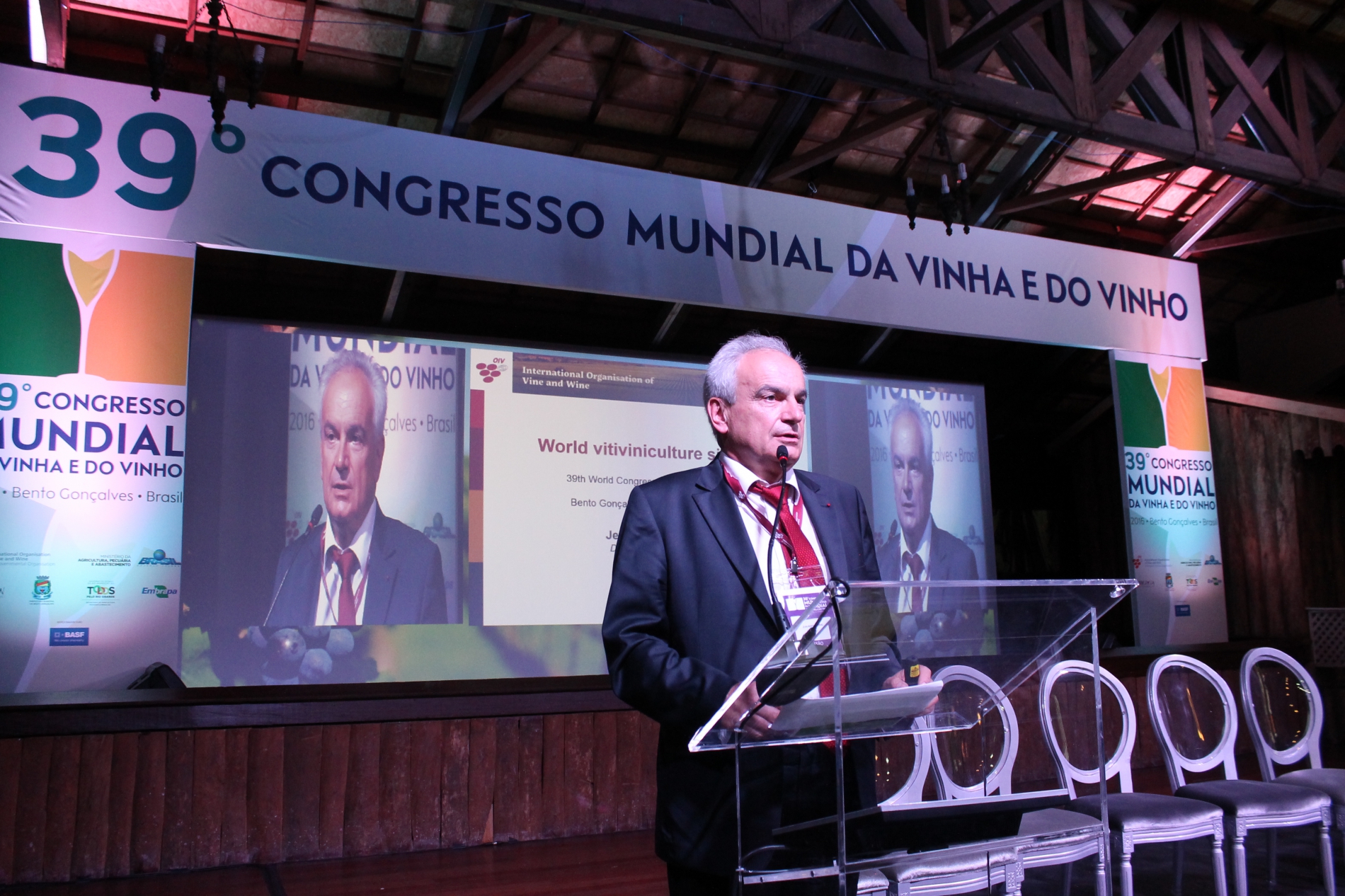05 дек 2016
'Traceability and authenticity in vitiviniculture, Wine Track 2016'This day was presided over by Iñigo Nagore Ferrer (Minister of Agriculture, Food and Environment for La Rioja), Jean-Pierre Dal Pont (President of the French Society of Chemical Experts; SECF), Julio Rubio García (President of the University of La Rioja) and José Miguel Martínez Zapater (Director of the Institute of Grapevine and Wine Sciences; ICVV). Additionally, researchers from various research centres and universities, as well as representatives from the Ministry for Agriculture, Fishing, Food and Environment (MAGRAMA), the Spanish Wine Federation (FEV), wineries and professionals in the vitivinicultural sector and in traceability, as well as students, were among the 200 or so people who took part. Find out more
29 ноя 2016
Published in paper format on a continuous tri-monthly basis since 1928, the OIV Bulletin is an essential source of information for all actors in the wine field: a century's worth of knowledge and vitivinicultural regulations in the digital age. Dating from 1928 to 2014, more than 1000 issues of the Bulletin will be published, within which nearly 300 000 articles published in the international press will be highlighted. These constitute an exceptional library of statistics, regulations, scientific and technical work, and recommendations – a veritable testament to a century of evolution of vitiviniculture, which has become truly global. Dating from 1928 to 2014, more than 1000 issues of the Bulletin will be published During the presentation event, which was held in Dijon on 29 November 2016, OIV Assistant to the Director General Yann Juban praised the exemplariness of this partnership that allows the world of vine and wine to have digital access to this entire unique collection of the OIV Bulletin. It is all thanks to the initiative of the University of Bourgogne, the expertise of the Maison des Sciences de l’Homme (Human sciences institute for research, MSH) and the support of various partners, including the AIDV. (Left to right): Jean Vigreux, Laurent Gautier and Yann Juban As indicated by one of MSH's Assistant Directors Jean Vigreux, the project – developed by this institute for research following its successful tender for the French Digital Scientific Library (Bibliothèque Scientifique Numérique, BSN) – breathes new life into these bulletins. Not only has it produced a digital version of the often-difficult-to-access paper documents, it also provides powerful research tools that make it possible to selectively search millions of pages representing almost a century of vitivinicultural knowledge and regulations. The project not only produced a digital version of the often-difficult-to-access paper documents, it also provides powerful research tools Thanks to the digital tool, doctors, ampelographers, oenologists, legal professionals, economists, historians, geographers, linguists and wine lovers will all find useful resources in this document resource – the first examples of which were presented during this restoration event by Benjamin Bois, President of the OIV "Viticulture" Commission. Benjamin Bois Integrated into the PANDOR portal of MSH Dijon, this multi-disciplinary resource may both be filtered by thematic indexes relating to the field in question (authors, geographical locations, designations, OIV Congresses, etc.) and searched in plain text mode. This also carries this invaluable corpus into the digital humanities and data mining age, as specified by Professor Laurent Gautier, the scientific director of this project, which comprises over 100 000 digital files equating to a total volume of 5 To of data. This safeguarded heritage is thus available, accessible and usable. Its digitisation meets current demands for knowledge sharing and enhances vine-and-wine knowledge. Very soon the 'paper' collection thus digitised will be supplemented by the latest issues dating from 1999 to 2014. Today the OIV is pursuing its mission to collect, process and ensure the diffusion of the most relevant information and to communicate it by publishing all scientific communications since 2014 from the World congresses of vine and wine via an online digital publishing platform, as well as still producing online reviews of the international press. Consult it online
29 ноя 2016
The Director General of the OIV, Jean-Marie Aurand, took part in the official opening of this event, whose programme of technical and scientific conferences was placed under the patronage of the OIV.The trade show brought together 850 exhibitors from 20 different countries and hosted almost 45 000 visitors.A veritable showcase for materials, equipment and services, Vinitech-Sifel places a strong emphasis on innovation – which is important both to improve the competitiveness of companies in the vitivinicultural sector and to address the major issues for the field in terms of environmental protection and consumer expectations.
21 ноя 2016
This professional trade fair brought together more than 225 companies representing over 85% of the global bulk wine trade.Jean-Marie Aurand with José Luis Murcia, Conference CoordinatorDuring the programme of conferences organised as part of this exhibition and placed under the patronage of the OIV, Director General Jean-Marie Aurand gave a presentation on the overall state of the wine market, with a particular focus on the bulk wine trade. This sub-sector is steadily developing, with exports rising from 15 million hectolitres in 2000 to 40 million in 2016 – equating to 38% of the total volume of wine exported in the world. Seven countries account for 85% of bulk wine exports: Spain (35%), Italy (12%), Australia (10%), Chile (10%), South Africa (7%), France (6%) and the United States (5%).
17 ноя 2016
During a meeting with the Secretary General of the Ministry of Agriculture, Prof. Mohammed Sadiki, in the presence of the Director General of the ONSSA (National Office for Health Security of Food Products) and his colleagues, the OIV President and the Director General welcomed the quality of the collaboration between the Moroccan authorities and the Organisation, expressing the desire for this to be continued and further developed. The even greater participation of the Moroccan experts in the work of the OIV, as well as the possibility of organising a presentation of Moroccan wines at the Organisation's headquarters, was discussed in this spirit.Professor Mohammed Sadiki (in the centre of the group photo) confirmed his country's commitment to the OIV and the Moroccan authorities' desire to strengthen this relationship at a time when Moroccan viticulture is making great efforts to adapt and modernise.With a surface area of 50 000 ha of vines, Morocco produces over 4 000 000 tons of grapes – 80% of which are destined for direct consumption and 20% for vinification.Table-grape and dried-grape production is steadily growing, while wine production (350 000 hL/year) has seen a revival thanks to a proactive policy of quality promotion and identification of wines through geographical indications and designations of origin.With regard to COP22, Monika Christmann and Jean-Marie Aurand participated in the work of the 4 per 1000 initiative, which involves promoting carbon sequestration in the soil through appropriate agronomic practices and thus helping to reduce greenhouse gases.This initiative launched in Paris during COP21 brought together over 170 organisations (states, intergovernmental organisations, research institutes, non-governmental organisations) and the OIV was involved in the project.During his speech the President highlighted the OIV's interest in the work conducted within this Forum, which fits perfectly with the work areas of the Organisation in terms of climate change and sustainable development.
03 ноя 2016
During a working lunch at the invitation of Santiago Queirolo, President of the Vitivinicultural Committee of the National Society of Industries (which brings together the main companies in the sector), Jean-Marie Aurand presented the actions led by the OIV and called for the increased participation of Peruvian experts in the work of the Organisation.Mr Aurand attended a meeting with the Vice-Minister for Small- and Medium-Sized Entreprises and Industry and also President of the National Pisco Commission, Juan Mathews Salazar, who affirmed the importance that Peru attaches to the OIV at a time when vitiviniculture is developing and modernising. Several actions were considered to bolster relations with the Organisation, including strengthening Peruvian expertise and the possibility of organising a presentation of Pisco and Peruvian wines at the OIV headquarters in 2017.These guidelines were confirmed at a meeting with the Director for Agriculture, Edson Seopa Ruiz, at the Ministry of Agriculture.The Director General also gave a presentation at the Institute of Wine and Pisco on the state of the global vitivinicultural sector and the major issues it faces.Peruvian viticulture has been undergoing a significant revival for some years now. Over the last 10 years, the vineyard surface area has doubled, reaching 32 000 ha in 2015. With more than 510 000 tons of table grapes produced in 2015 – 60% of which were exported – Peru is demonstrating its ambitions.Wine production has seen an increase of almost 20% in 10 years, reaching 700 000 hL, while consumption has followed the same growth pattern, establishing itself at 785 000 hL.Finally, Pisco – an emblematic product for which a competition placed under the patronage of the OIV is held every year – experienced a rise in its production and reached over 9.5 million litres in 2015.
03 ноя 2016
This competition brought together 140 wines from 5 countries.Placed under the patronage of the OIV and the International Union of Oenologists (Union Internationale des Œnologues), this competition promotes wines made from Tannat – an emblematic vine variety in Uruguayan vitiviniculture.While on this visit, Jean-Marie Aurand met with the Vice-Minister for Foreign Affairs, Dr José Luis Cancela, in the presence of the INAVI (National Institute of Vitiviniculture) President, José Lez Secchi, in order to look into how to organise the future OIV Congress, which will be held at the end of November 2018 in Punta del Este. The Vice-Minister expressed his delight that Uruguay was able to host the Congress and reaffirmed his country's full support for the OIV.In 2016, Uruguay produced 104 500 tons of grapes from 6745 hectares, 97% of which are dedicated to vinification. Red vine varieties represent 80% of the vineyard surface area, with Tannat in the lead (25%) followed by Muscat of Hamburg (19%) and Merlot (11%).
27 окт 2016
Decisions on Viticulture and the Environment
- Following the adoption of the previous guides on sustainable production, the OIV adopted the 'General Principles of Sustainable Vitiviniculture – Environmental - Social - Economic Aspects' (Resolution OIV-CST 518-2016), whose objective is to specify the definition and scope of application of sustainable production and to provide general principles applicable to all vitivinicultural products. These general principles should serve as a basis for the preparation or revision of guides for the implementation of sustainable vitiviniculture by integrating the three aspects of sustainability: the environmental, social and economic. The development of production systems and practices that preserve and improve the usage conditions of these natural resources and also strengthen the economic conditions of the area of production is imperative for the long-term viability of vitivinicultural activities.
- In the field of dried grape production, the OIV adopted a good practice guide for dried grape production systems (Resolution OIV-VITI 522-2016). This document is designed to complement Resolution OIV-VITI 493-2013, which relates to 'OIV recommendations for the production of dried grapes'. Its objective is to provide technical requirements relative to dried grape production, so that these could be recommended to producers and national and/or international organisations.
- The updating of oenological practices by adapting them accordingly to take into account the ever-growing use of non-Saccharomyces cerevisiae yeasts within winemaking processes (Resolution OIV-OENO 546 2016).
- The treatment of wines using filter plates containing zeolites Y-faujasite to adsorb chloroanisoles (Resolution OIV-OENO 444-2016). The objective of this practice is to reduce the content of chloroanisoles responsible for odour alterations in wines by reducing their levels below the organoleptic perception threshold using filter plates containing zeolites Y-faujasite during filtration.
- The updating of practices relative to the oxygenation of musts and wines (Resolutions OIV-OENO 545A-2016 and OIV OENO 545B 2016). These practices have the objectives of, on the one hand, accelerating the process of oxidation of musts with the aim of causing browning reactions in phenolic compounds to improve the stability of wines in relation to oxidation and, on the other, contributing to the reduction of the vegetal character and disappearance of reductive aromas, as well as ensuring alcoholic fermentation occurs smoothly and avoiding stuck fermentations. Additionally, the oxygenation of wines has the aims of contributing to the stabilisation of colouring matter and the maturing of red wines, of preparing wines intended for treatments to eliminate excess iron through oxidation of ferrous iron into ferric iron, of reducing the 'volatile sulphur compound' content and of decreasing the vegetal character of wines.
- The treatment of wines with potassium polyaspartate was permitted by the OIV within the context of the tartaric stabilisation of wines (Resolution OIV-OENO 543-2016). This new additive should be used at the optimal dose of 100 mg/L. At stronger doses, the stabilising effect of potassium polyaspartate is not improved and, in some cases, may provoke an increase in the turbidity of the wine.
- For the first time, with regard to the substances already permitted by the OIV, the Organisation differentiated between substances used as additives and those used as processing aids (Resolution OIV-OENO 567A-2016). This distinction will help to establish better harmonisation among the international organisations and to facilitate the international trade of grape wines. The list examined is not an exhaustive list of additives and processing aids, and the OIV will continue to examine and consider additives and processing aids proposed for wine production.
- A monograph on zeolite Y-faujasite (Resolution OIV-OENO 506-2016). Various detailed specifications accompany this monograph, including one regarding the silica-to-aluminium ratio, which should be 3 or higher. This monograph thus supplements the oenological practice that permits the treatment of wines with this copolymer.
- A revision of the monograph on proteins of plant origin (Resolution OIV-OENO 575-2016). The iron limit was increased to 300 ppm, exclusively for pea and potato proteins, while the zinc limit was raised to 150 ppm, solely for pea proteins.
- 'Provisions on the use of proprietary methods that should be adopted by the OIV' (Resolution OIV-OENO 526 2016). Just like the Codex Alimentarius, the OIV has adopted a list of requirements that – for the purposes of adoption by the Organisation – should be met by methods that contain protected intellectual property preventing full disclosure of information about the method and/or where the intellectual-property rights owner restricts the use or distribution of the method or materials necessary for its performance. Primarily, a proprietary method should not be endorsed if a suitable non-proprietary method of analysis is available that has been or could be endorsed and that has similar or better performance.
- The method for the determination of sugars in musts and wines by high-performance liquid chromatography was revised (Resolution OIV-OENO 552-2016). This method, validated by an interlaboratory trial, applies to the direct quantification of sugars in musts and wines up to 20 g/L and, after dilution, beyond. Glycerol (between 0.5 and 15 g/L) and sucrose (between 1 and 40 g/L) may also be determined in the same way. Sugars and glycerol are separated by HPLC by means of an alkylamine column and detected by refractometry.
- The method for the determination of alcoholic strength by volume was also updated to consider the measurement in beverages with a low alcohol content (Resolution OIV-OENO 566-2016). Therefore, the procedure was modified slightly in order to take into account beverages with an alcoholic strength by volume less than or equal to 1.5% vol.
- A method relative to the analysis of volatile compounds in wines by gas chromatography (Resolution OIV-OENO 553-2016). This method is applicable to the analysis of almost 30 volatile compounds in wines containing less than 20 g/L sugar. For wines with a sugar content higher than 20 g/L and for mistelles, prior distillation (identical to that practised to obtain the ABV) is necessary, however distillation entrains a sometimes significant part of the compounds.
- The OIV also adopted recommendations for the establishment of training programmes for oenologists (Resolution OIV-ECO 563-2016). The oenologist training programme should ensure that the oenologist in question is capable of working diligently in each of the five lines of work defined by Resolution OIV-ECO 492-2013, is able to handle the duties described in said Resolution and has in-depth and continually-updated knowledge of all the practices to be carried out under their control. These programmes were established according to the UNESCO International Standard Classification of Education (ISCED-UNESCO 2011). In this respect, oenologist training programmes are considered tertiary education and may be developed at different levels.
- Finally, the OIV adopted a new definition within the category of special wines that refers specifically to wines with an alcohol content modified by dealcoholisation (Resolution OIV-ECO 523-2016). Wine with an alcohol content modified by dealcoholisation is a beverage obtained exclusively from wine or special wine that has undergone a dealcoholisation treatment reducing the initial actual alcohol content by volume of the wine or special wine by a proportion of more than 20% and whose actual alcohol content is equal to or greater than the relevant minimum actual alcohol content for wine.
27 окт 2016
Thanks to the joint work of the Brazilian Ministry of Agriculture, the state of Rio Grande do Sul, the city of Bento Gonçalves, Embrapa and Ibravin, the Brazilian wine capital became the global capital of the sector on 23-28 October 2016.With the Brazilian authoritiesMonika Christmann, the President of the OIV, emphasised the quality of the scientific and technical presentations, which provided a better understanding, in particular, of the realities of Brazilian viticulture and the country's high level of university research. The technical visits to various wine-growing areas also showed the potential of this vitiviniculture, a large part of which is destined for the production of quality sparkling wines.The Director General of the OIV, Jean-Marie Aurand, stressed the dynamism and enthusiasm of the participants, which allowed for rich, quality exchanges. There was also a strong presence of young researchers from different countries, demonstrating a certain revival and the attractiveness of both the vitivinicultural sector and the OIV. The 14th General Assembly of the OIV concluded the week of scientific work by approving the adoption of 16 new resolutions, in particular in the fields of the environment, oenology or economy and law.The General Assembly of OIV Member States also formalised Mexico's return to the OIV, making it the 46th Member Country integrated by the OIV, and accepted Switzerland's invitation to host the 2019 Congress.
23 окт 2016
The report covers the vitivinicultural production potential, areas under vines, global wine production and consumption, and wine import and export volumes.•In 2015, the world area under vines rose to 7.5 mha.•Global grape production reached 76 mt in 2015.•2016 world wine production (excluding juice and musts) is estimated at 259 mhl.•World wine consumption in 2015 is estimated at 240 mhl.Press releasePPT PresentationOIV report on the world vitivinicultural situationExtract “Table and dried grapes focus 2016” [EN]
